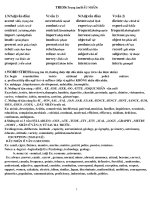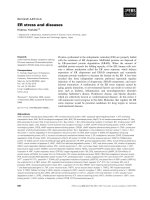08 passive recovery stress and relaxation
Bạn đang xem bản rút gọn của tài liệu. Xem và tải ngay bản đầy đủ của tài liệu tại đây (472.12 KB, 16 trang )
UNIVERSITY
Passive
Recovery:
Stress and
Rest
How to manage stress and
relax
Lesson Overview
•
•
•
•
•
•
•
What is Stress
Healthy Mental State
Addressing Stressors
Coping with Stress
Supplements for Stress
Relaxation
Rest
What is Stress
• Stressors disrupt homeostasis
• Allosteric Load total number of stressors occurring
• Psychological stress can cause same catabolic response as a physical
stressor
• Social Stress
• Relationships, community, loneliness
• Existential Stress
• Lack of meaning, despair, purpose
• Emotional Stress
• Anger, shame, fear
• Mental Stress
• Decision fatigue, info overload, perfectionism, obsessive
Healthy Mental State
•
•
•
•
•
Improved Sleep
Enhanced Motivation for training and recovery
Increased self awareness of needs
Decreased mental fatigue
Decrease injury risk
Tackling Stressors Head On
Social stress
• Establish health relationships, get rid of negative
• Find a great coach
• Find community
• Set boundaries
• Focus on yourself
Existential Stress
• Pursue your purpose
• Self actualization
Emotional Stress
• Finding root driver of emotional trigger
Mental Stress
• Set limits on obsessions, information gathering, decisions
• Choose appropriate nutrition, training protocols
Financial Stress
Bodybuilding is expensive and does not pay well
Advance your career and education first
Personal Finance
1. Take Inventory
2. Make a budget (Every Dollar Budget App)
3. Live within that budget
4. Pay off Debt
Dave Ramsey Financial Peace University
Competitive Stress
• Visualization and Imagery
•
•
•
•
•
Competition day success
Hitting gym Personal Records
Own the Log book
Self talk “you are the champion”
Live in the moment
Coping With Stress
• Acceptance of level of control
• Positive Attitude
• Self talk
• visualization
• Perspective
• Think of the big picture
• Communication
• Share your feelings
Behavior Awareness
• Emotions are under chemical control, but we can control our
behaviors
• Meditation and Mindfulness
• Journaling thought process and feelings from daily stressors
•
•
•
•
What were you doing
What did you think about
What did you feel emotionally and physically
What response is positive in place
Motivation
Set goals but focus on the process
• Make the GOAL board
Self Determination Theory for Human Motivation
Process Enjoyment
Self Improvement
• Competence
• Learning, structure and flexibility
• Autonomy
• Control of goals, independence
• Relatedness
• Connection with others and coach
Goals Achieved
Time Management
•
•
•
•
•
•
•
•
•
Make a To-do list
Look for ways to be more efficient
Organize your space and plans
Delegate tasks
Limit social media
Allot time for phone calls and emails
Use waiting time efficiently
In the gym use super sets and rest pause sets
Bulk cooking
Stress Supplements
Ashwaghanda 500mg with last meal per day
• Adaptogen Herb
• Anxiety, stress, fatigue reduction
• Serum Cortisol reduction 14-27%
• Reduction in TSH and increased T3/T4 in
subclinical hypothyroidism
L-Theanine 200mg first thing AM or PM per
day
• Amino acid
• Reduced perception of stress and improved
attention
• Synergistic with caffeine
• No sedative effect
Vitamin D 2000-5000IU per day
• 1st most common vitamin deficiency
• High in fatty fish and fortified dairy
• Mitigate Depression, VDR in skeletal muscle
• Serum 25 OH D3 optimal 40-60 nmol/L
Magnesium Citrate 400mg per day
• 2nd most common vitamin deficiency
• High in nuts and leafy greens
• Modulates the NMDA receptor
Omega 3 (EPA and DHA) AHA recommend 1g;
3-4g Optimal per day
• Essential Fatty Acids
• Reduction in inflammation and TG
• Fatty Fish
Zinc 10-40mg
• 10% in US deficient
• Found in meat, nuts, milk
• Low levels associated with depression,
increased illness, low testosterone and low
insulin sensitivity
Relaxation
Reducing the stressed/heightened state back down to calm and rested
one
Improved parasympathetic activity
Decreased heart rate and blood pressure
Decreased cortisol and catecholamines
Decrease catabolism and increased anabolism
Improved mood and focus
Decreased anxiety
Reduction of fatigue
Relaxation
•
•
•
•
•
•
•
•
•
•
•
Plan fun activities
Lying on the couch
Hobbies
Socializing
Yoga
Music
Television
Coloring and Drawing
Reading
Play with pets
Get outdoors
Rest Days
Planned rest days off from training
No formal training
Recovery from psychological fatigue
Plan Fun activities on this day
GO RELAX!!!









